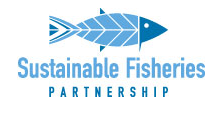The Sustainable Fisheries Partnership (SFP) has issued a brief, 'Climate Change: Implications for Fisheries and Aquaculture,' which details the threats of climate change and ocean acidification to fisheries, aquaculture and marine resources as relayed in the Intergovernmental Panel on Climate Change (IPCC) Fifth Assessment Report (AR5).
 28 May 2014: The Sustainable Fisheries Partnership (SFP) has issued a brief, titled ‘Climate Change: Implications for Fisheries and Aquaculture,’ which details the threats of climate change and ocean acidification to fisheries, aquaculture and marine resources as relayed in the Intergovernmental Panel on Climate Change (IPCC) Fifth Assessment Report (AR5).
28 May 2014: The Sustainable Fisheries Partnership (SFP) has issued a brief, titled ‘Climate Change: Implications for Fisheries and Aquaculture,’ which details the threats of climate change and ocean acidification to fisheries, aquaculture and marine resources as relayed in the Intergovernmental Panel on Climate Change (IPCC) Fifth Assessment Report (AR5).
The brief highlights that climate change and ocean acidification are altering ocean ecosystems, leading to a loss of marine biodiversity and changes in seafood production levels, including through the displacement of stocks and rising mortality of shellfish. It notes that other factors such as over-fishing, habitat loss and pollution worsen the impacts of climate change on marine resources. The publication also highlights impending issues such as: the rapid decline of coral reef ecosystems, with the risk of collapse of some coastal fisheries; the likely increase in coral bleaching; potential increases in illegal, unreported and unregulated (IUU) fishing from changes in coastal resources and food insecurity; and possible mass die-offs in farmed fish due to harmful algal blooms.
The brief explains that fishers can adapt to some of the impacts, through, inter alia: changing gear or target species; increasing aquaculture; and moving to dynamic management policies. Additionally, some positive impacts of climate change are highlighted, including faster growth rates and food conversion efficiency, longer growing seasons, and new growing areas due to decreases in ice cover.
Regarding the potential for mitigation in the fisheries sector, the brief highlights options such as strengthening coastal zone management to reduce land-sourced pollution, over harvesting and physical damage to resources. It also suggests creating new habitats, such as artificial reefs, to act as fish nurseries in areas where coral reef destruction occurs. According to the report, protecting some ocean ecosystems will help moderate the speed and scale of climate change, as well as build ecosystem health.
The brief is published jointly by the SFP and the University of Cambridge Institute for Sustainability Leadership and Cambridge Judge Business School, and is supported by the European Climate Foundation. It is one of a series of publications synthesizing the most relevant AR5 findings for specific economic and business sectors, and grew from the idea that the fisheries and aquaculture sector could make better use of the AR5, if distilled into an accessible and succinct summary. [SFP News Story] [Publication: Climate Change: Implications for Fisheries and Aquaculture]